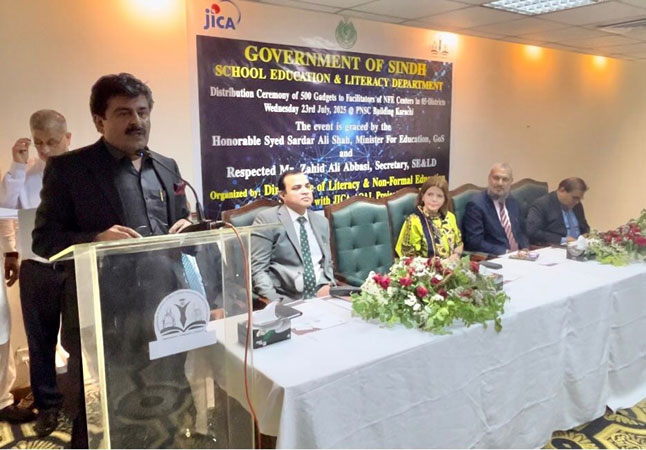July 24, Pakistan — As a major move to digitalize the non-formal education system, the Sindh government, along with the School Education and Literacy Department and Japan International Cooperation (JICA), has provided 500 devices to 500 non-formal education centers spread throughout Sindh. The distribution event took place in Karachi, where Sindh Education Minister Syed Sardar Ali Shah served as the main guest. Other attendees included Secretary of the School Education and Literacy Department Zahid Ali Abbasi, Director of Literacy and Non-Formal Education (LNFE) Sindh Abdul Jabbar Mari, Chief Program Manager RSU Dr. Junaid Samoo, Chief Executive Advisor of Curriculum Wing Dr. Fauzia Khan, Executive Director STEDA Rasool Bux Shah, Director General Monitoring and Evaluation Mola Bux Sheikh, JICA Deputy Chief Advisor Abid Gul, relevant department officials, representatives from partner organizations, and facilitators from the centers.
At the event, Education Minister Syed Sardar Ali Shah mentioned that the Sindh government has initiated a significant effort to tackle the problem of children not attending school in the province. He highlighted that this gap cannot be bridged solely through traditional education systems and that non-formal education is the most effective method to ensure as many out-of-school children as possible get access to learning. The Minister pointed out that approximately 1.6 million children are born in Sindh annually, with only 800,000 to 1 million enrolled in public and private schools. However, according to available resources, the government can only educate between 200,000 and 300,000 children through conventional methods. Recognizing these challenges, he underlined the importance of seeking alternative solutions.
Syed Sardar Ali Shah mentioned that offering digital resources to non-formal centers will help modernize them and ensure ongoing communication with these centers for online teacher development. He also revealed that as part of the expansion of non-formal education programs, 3,000 centers will be set up throughout Sindh, aiding 100,000 children in completing their education quickly outside the traditional system. Secretary of School Education Zahid Ali Abbasi, in his speech, noted that the devices will aid in monitoring non-formal centers and allow direct assessment of their performance, including student attendance and academic progress. JICA Deputy Chief Advisor Abid Gul stated that the devices will simplify the provision of regular teacher training, ensuring educators remain familiar with contemporary teaching techniques.
Speaking at the event, Director of Literacy and Non-Formal Education (LNFE) in Sindh, Abdul Jabbar Mari, stated that during the initial stage of the non-formal education program in Sindh, 500 centers have been set up in Jacobabad, Kashmore, Mirpurkhas, Tharparkar, and Umerkot, aiming to provide education to 15,000 children. Presently, 16,349 students are registered in these centers, with 8,598 being girls, which is more than the number of boys. He emphasized that these centers have been established in regions with the lowest literacy levels, focusing on disadvantaged groups, and offering educational opportunities to children between the ages of 9 and 16.







